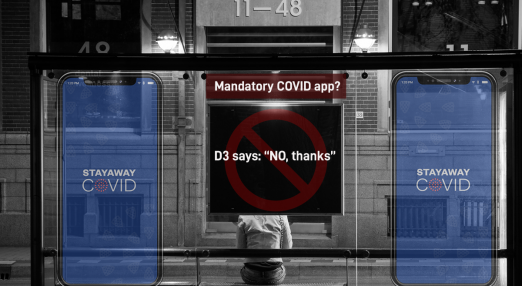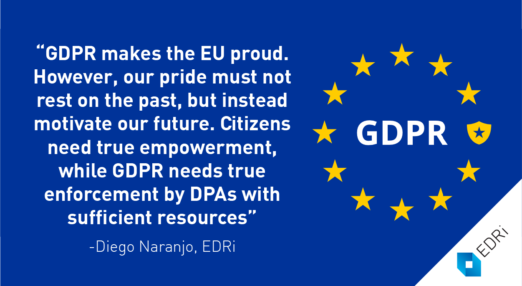Data protection standards
Filter resources
-

Oracle and Salesforce taken to court in the Netherlands over GDPR infringement
Dutch Foundation “The Privacy Collective” is suing tech giants Oracle and Salesforce for the misuse of millions of people’s data under GDPR.
Read more
-

D3 opposes Portuguese efforts to make COVID app mandatory
In this post, EDRi's member Defesa dos Direitos Digitais (D3) discusses the proposed law on making the tracing app “Stayaway Covid” obligatory in Portugal and analyses the consequences of such legislation.
Read more
-

UK data regulator takes enforcement action to rein in data brokers’ use of people’s personal data
In a landmark decision that shines a light on widespread data protection failings by the entire data broker industry, the ICO has today taken enforcement action against Experian, based in part on a complaint Privacy International made in 2018.
Read more
-

People, not experiments: why cities must end biometric surveillance
We debated the use of facial recognition in cities with the policy makers and law enforcement officials who actually use it. The discussion got to the heart of EDRi’s warnings that biometric surveillance puts limits on everyone’s rights and freedoms, amplifies discrimination, and treats all of us as experimental test subjects. This techno-driven democratic vacuum must be stopped.
Read more
-

How to create an excellent process to deliver a worthless contact-tracing app
As it became clear that Covid-19 would not spare Europe, contact-tracing apps quickly surfaced across the continent as the tech-solutionist quick fix. The Netherlands was no exception.
Read more
-

For the “right to analog”: IuRe strengthens the Digital Freedoms program
For almost twenty years, the Czech watchdog Iuridicum Remedium (IuRe) has been fighting for human freedoms in real and digital life. In its Digital Freedoms program, IuRe is currently working on several interlinked digital freedom campaigns that can be found via their new campaigning website.
Read more
-

Booklet: Launch of Data Retention Revisited
Today we are pleased to launch our updated handbook: “Data Retention Revisited”. The handbook is one of the few dedicated resources created on the topic of data retention in the European Union (EU).
Read more
-

‘Not On Our Watch’: A public campaign against Google’s jump into our health data
Monopolies, mergers and acquisitions, anti-trust laws. These may seem like tangential or irrelevant issues for privacy and digital rights organisations. But having run our first public petition opposing a big tech merger, we wanted to set out why we think this is an important frontier for people's rights across Europe and indeed across the world.
Read more
-

A victory for us all: European Court of Justice makes landmark ruling to invalidate the Privacy Shield
Today, 16 July 2020, the Court of Justice of the European Union (CJEU) invalidated the EU-US Privacy Shield. The ruling proves a major victory for EU residents on how their personal data is processed and used by platforms like Facebook.
Read more
-

Spain: Catalan government agrees to improve privacy in schools
The Catalan Department of Education has signed an agreement accepting the plan proposed by Xnet, EDRi member from Spain, titled “Privacy and Democratic Digitization of Educational Centers,” to guarantee the privacy of data and the democratic digitization of schools. The plan foresees the creation of a software-pack and protocols that ensure the educational establishments have alternatives to what until now seemed the only option: the technological dependence on Google and its attached elements, with worrying consequences on individual data.
Read more
-

Europol: Non-accountable cooperation with IT companies could go further
There is an ongoing mantra among law enforcement authorities in Europe according to which private companies are indispensable partners in the fight against “cyber-enabled” crimes as they are often in possession of personal data relevant for law enforcement operations. For that reason, police authorities increasingly attempt to lay hands on data held by companies – sometimes in disregard to the safeguards imposed by long-standing judicial cooperation mechanisms.
Read more
-

EU must let its crown jewel shine: GDPR needs progress
On 24 June, the European Commission published the Communication reviewing of the two years of application of the General Data Protection Regulation (GDPR) The Communication received input from the multistakeholder expert group on the application of the GDPR, of which EDRi members Access Now and Privacy International belong to.
Read more
